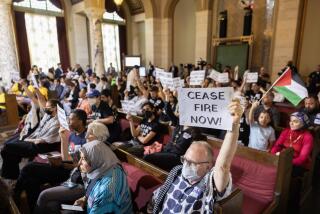Cambodians Ask for More Police Patrols to Curb Crime, Gangs : Crime: City manager’s staff told to draft a plan answering the pleas for a police substation in Anaheim Street district and bilingual emergency dispatchers.
- Share via
In rare displays of discontent, members of Long Beach’s Cambodian community have twice marched on City Hall in recent weeks to demand action on crime and the gang warfare that are overtaking their neighborhoods.
Two weeks ago dozens of Cambodian business owners in the city’s Little Phnom Penh district along Anaheim Street shut their doors and rallied at City Hall to protest the gang violence that has claimed nine lives and injured dozens since 1989.
Tuesday about 30 Cambodians appeared before the City Council with calls for more police protection and bilingual emergency dispatchers.
They were greeted with remarks of concern from the council, which directed the city manager’s staff to report back within three weeks with a plan for answering the group’s demands.
“Overall, I think something is moving. Who knows what,” observed Vora Kanthoul, associate executive director of United Cambodian Community Inc., a social services organization. “It’s symbolic that they spent the whole morning (on the issue), but we won’t know for two or three weeks.”
Kanthoul and others asked the council to assign police foot patrols to the Anaheim Street corridor that forms the core of the city’s large Cambodian community, to open a police substation in the district, put more pressure on criminals, and staff the 911 emergency number with dispatchers fluent in Khmer, the Cambodian language.
“Our streets, our schools, our temple, our community and our businesses have been taken away from us,” lamented Thommy Nou, manager of a Cambodian restaurant on Anaheim Street.
At the rally two weeks ago, when some 150 Cambodians descended on City Hall, community leaders complained that the city’s 45,000 Cambodians felt little safer in Long Beach than in the war-ravaged country they fled a decade or more ago.
Warring Latino and Cambodian gangs have killed nine people in the last year and a half. The most recent murder was less than a month ago, when a 17-year-old Cambodian boy was shot in his living room by two suspected Latino gang members in apparent retaliation for other incidents, even though the victim did not belong to a gang.
Just last week, a school bus full of children was caught in the cross-fire between Latino and Cambodian gangs. No one was hurt.
Asian gang members are also intimidating business owners with extortion rings. According to police, gang members frequently threaten to attack Cambodian businesses whose owners do not pay “protection” fees. Many of the businesses end up paying, police said. And in several instances, they said, the gang members have carried out their threats by torching or otherwise damaging businesses.
Assistant City Manager John Shirey expressed reservations about both the foot patrol and substation proposals, saying they should be considered during coming budget discussions. Foot patrols are effective, he conceded, but because they take officers out of their cruisers, they slow response time to emergency calls. And substations are expensive to operate.
But City Council members, several of whom are up for reelection next year and have Cambodians in their districts, were for the most part sympathetic. “I think we’ve had discussion for long enough,” said Councilman Tom Clark, referring to years of talks about increasing foot patrols and opening police offices in the city’s central section.
“We’re waiting until the bodies drop at our doorstep before we get up and do something,” grumbled Councilman Ray Grabinski, urging action and questioning some of the city’s spending priorities. “Maybe it’s a little stupid to pay for trimming trees every year if families can’t walk under them.”
Mayor Ernie Kell was largely silent during the discussion but warned that the council needed to be careful not to further divide the city by adding police protection to one area and not another.
Councilman Les Robbins, a Los Angeles County sheriff’s deputy, raised another issue. Cambodians, he suggested, need to shed their distrust of police and be more forthcoming with information about crime. “We can spend a zillion dollars a year, and if we don’t get the help of the community, it’s going to be money down the drain.”
In an interview, Kanthoul said Cambodians would become more responsive if police stepped up enforcement in their district. “We feel the police are not doing anything for the community. So people are afraid of coming forward and being exposed to more retaliation (from gang members) without protection.”
More to Read
Sign up for Essential California
The most important California stories and recommendations in your inbox every morning.
You may occasionally receive promotional content from the Los Angeles Times.














